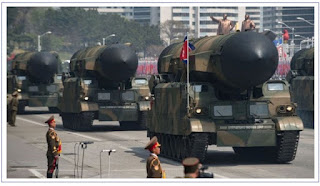North Korea launched a
ballistic missile Sunday morning that flew around 430 miles before crashing
into the sea, U.S. and South Korean military officials said, in what appears to
be the latest missile test in defiance of United Nations sanctions.
The unidentified
ballistic missile was launched at 5:27 a.m. Sunday off Kusong north of the
North Korean capital of Pyongyang, a South Korean military official said.
The missile is not
believed to be an intercontinental ballistic missile, U.S. Pacific Command
said. Defense officials said the U.S. is assessing whether it was a success or
failure. "Right now it sure looks successful," one U.S. defense
official said.
U.S. President Donald
Trump was briefed, the White House press secretary's office said in a statement
that "North Korea has been a flagrant menace for far too long," and
which also suggested that Russia should be concerned. "With the
missile impacting so close to Russian soil in fact, closer to Russia than to
Japan the President cannot imagine that Russia is pleased," the White House
statement said.
South Korea's newly
elected president, Moon Jae-in, called for the national security council to
meet on the matter, a presidential spokesperson said.
A South Korean military
official said the missile traveled around 700 km, or just over 430 miles. The
military official said "we are totally ready to meet and deter any and all
military provocation."
Sunday's missile test
comes after several North Korean missile launches or attempts this year. Late
last month, North Korea launched what was believed to be a
short-ranged ballistic missile, but the missile exploded just after
launch. There have been escalating tensions in the Korean peninsula over
the North's missile tests as well as the deployment in South Korea of
the U.S. missile defense system known as Terminal High Altitude Area Defense,
or THAAD.
The White House press
secretary's office in the statement urged tougher sanctions against North
Korea."The United States maintains our ironclad commitment to stand with
our allies in the face of the serious threat posed by North Korea. Let this
latest provocation serve as a call for all nations to implement far stronger
sanctions against North Korea," the White House said.
Japanese Prime Minister
Shinzo Abe condemned the missile launch. "We absolutely cannot accept
this," Abe said. Japanese Defense Minister Tomomi Inada was quoted by
broadcaster NHK as saying the missile may be a new type of missile based on the
altitude reached.
The Trump administration
in March declared a change in policy towards North Korea. Secretary of State
Rex Tillerson said the "the policy of strategic patience has ended"
during a visit to South Korea, in which he also said military action could
be on the table if North Korea elevates the threat of its weapons programs.
President Donald Trump
in an interview with Reuters last month raised the possibility of a
"major, major conflict" with North Korea if other solutions
don't work. Trump earlier this month told Bloomberg that he
would be open to meeting with North Korean dictator Kim Jong Un if it was under
the right circumstances and appropriate to do so. White House Press Secretary
Sean Spicer later cited North Korea's provocative actions and other factors and
said "clearly the conditions are not there right now( NBC reporter)

